Amplified Piezo Stage for Microscope Slides
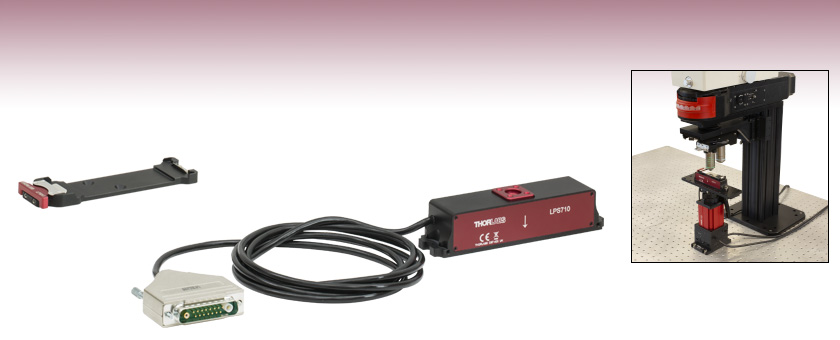
- High-Precision Z-Axis Translation with 2 nm Resolution (Open Loop)
- Travel Range: 1100 µm in Open Loop; 800 µm in Closed Loop
- Slim, Low-Profile Slide Holder and Stage
- Ideal for Z-Stack Image Acquisition
LPSA1
Microscope Slide Holder
(Slide not Included)
Application Idea
The LPS710E(/M) can be used to scan slides using a Cerna® microscope.
LPS710E
Piezo Scanning Stage
(Included Controller Not Shown)

Please Wait
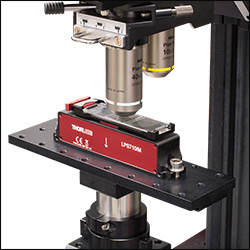
Click to Enlarge
Figure 1.1 The LPS710E/M stage and LPSA1/M slide holder attached to a MP10/M rigid stand for use with a Cerna® microscope.
| LPS710E(/M) Key Specificationsa | ||
|---|---|---|
| Drive Voltage Range (Max) | -25 V to 150 V | |
| Travel | Open Loop | 1100 µm ± 10% |
| Closed Loop | 800 µm | |
| Resolution | Open Loop | 2 nm |
| Closed Loop | 6 nm | |
| Accuracy | Closed Loop | ±0.06% (Over Full Travel Range) |
| Bidirectional Repeatability | Closed Loop | ±0.03% (Over Full Travel Range) |
| Angular Error | Closed Loop | ±40 µrad (Over Full Travel Range) |
| Maximum Loadb | 300 g (0.66 lbs) | |
| Outer Dimensions (L x W x H) |
130 mm x 28 mm x 30 mm (5.1" x 1.1" x 1.2") |
|
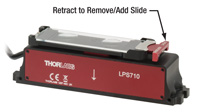
Click to Enlarge
Figure 1.2 Once mounted onto the LPS710(/M), secure a microscope slide onto the LPSA1(/M) using the spring-loaded plunger.
Features
- Long Range Z-Axis Motion
- 1100 µm When in Open Loop
- 800 µm When in Closed Loop
- Paired, High-Precision Controller and Capacitive Feedback Sensors Provide High-Resolution Positioning
- 2 nm Resolution in Open Loop
- 6 nm Resolution in Closed Loop
- Holder Secures Slides Between 2.88" to 3.00" Long, Up to 0.055" (1.4 mm) Thick and 1.00" (25.4 mm) Wide
- Kinesis® Interface, ThorImage®LS Integration, and Control via External Voltage
The LPS710E(/M) Amplified Piezo Stage provides long range, fine focus Z-axis travel for a microscope slide while maintaining a compact, low-profile footprint. It features submicron repeatability, nanometer positioning resolution, low angular error, and fast millisecond response and settling times. When used with the LPSA1(/M) microscope slide holder, the stage is ideal for imaging modalities requiring sensitive sample positioning and sectioning, such as confocal laser scanning microscopy. This stage is not compatible with trans-illumination.
The stage is driven by a discrete piezo stack housed within a hardened steel flexure structure that preloads the piezo stack and amplifies its displacement. When controlled in a closed loop, which provides higher precision positioning and reduced hysteresis, this results in a maximum total displacement of 800 µm; when operating in open-loop, the resulting maximum total displacement is 1100 µm. Built-in capacitive feedback sensors along with our high-precision piezo controller provide 6 nm resolution in closed-loop operation, enabling active compensation for short- and long-term drifts. When used in open loop, the controller will provide an accurate readout of the stage position with a resolution of 2 nm. An engraved arrow on the side of the unit indicates the direction of travel. For additional information on piezoelectric device structure and actuation, see the Piezoelectric Tutorial.
The LPSA1(/M) slide holder uses two countersunk cap screws to attach to the 21.0 mm x 21.0 mm mounting surface on the top of the LPS710E(/M). The mounting surface is equipped with four 4-40 (M3) blind mounting holes that are 4.8 mm deep to orient the slide holder in two orthogonal positions on the stage. The slide holder is compatible with microscope slides and test targets, as well as any rectangular optic from 2.88" (73.1 mm) to 3.00" (76.5 mm) long and up to 0.055" (1.4 mm) thick and 1.00" (25.4 mm) wide. Slides are secured using the red, spring-loaded plunger.
In addition to the slide holder, the stage can secure a Ø7 mm optic mount or other 4-40 (M3) equipped component. The base of the stage includes two slots for 1/4"-20 (M6) cap screws and two slots for 4-40 (M3) cap screws that can be used to secure the stage to a stage or breadboard for use with a microscope, such as our Rigid Stands or Translating Platforms, or directly to an optical table. In addition, the stage has two bottom- and side-located 4-40 (M3) mounting holes that can be used to secure the stage using our line of mini-series components.
Each stage is shipped with a piezo controller that has been factory calibrated to the specific stage to achieve maximum accuracy. It is not recommended to operate the piezo stage with a different controller. Piezo control is supported through the included Kinesis GUI, our ThorImage®LS image acquisition software, or an externally supplied control voltage. See the Software & External Control tab for more details. The controller offers USB and RS-232 interfaces for computer control; a BNC input for sine, sawtooth, and square wave drive signals; and a BNC output that gives either positioning feedback from the scanner's built-in capacitive sensors or a signal proportional to the piezo drive voltage. In addition, a DB15 connector provides signals that can be used for synchronization with external equipment.
| Piezo Stage Specifications | |
|---|---|
| Open-Loop Travel Range (-25 V to 150 V) | 1100 µm ± 10% |
| Closed-Loop Travel Range | 800 µm |
| Open-Loop Resolution | 2 nm |
| Closed-Loop Resolution | 6 nm |
| Maximum Loada | 300 g (0.66 lbs) |
| Feedback Transducer Type | Capacitive |
| Resonant Frequency (15 g Load) | Primary: 185 Hz ± 15% Secondary: 115 Hz ± 15% |
| Pull Force (Increasing Voltage) | 55 N ±15% |
| Push Force (Decreasing Voltage) | 45 N ±15% |
| Accuracy (Closed Loop - Over Full Travel Range) |
±0.06% |
| Bidirectional Repeatability (Closed Loop - Over Full Travel Range) |
±0.03% |
| Angular Error (Closed Loop - Over Full Travel Range) |
±40 µrad |
| Stiffness | 0.1 N/µm ±20% |
| Capacitance | 16 µF ± 15% |
| Cable Length | 2 m (6' 7") |
| Connector | Male 15-Way Mixed Signal Combination D-Sub |
| Dimensionsb | 130 mm x 28 mm x 30 mm (5.1" x 1.1" x 1.2") |
| Dimensions (Excluding Mounting Plate) | 130 mm x 28 mm x 28.5 mm (5.1" x 1.1" x 1.12") |
| Weightc | 180 g (0.40 lbs) |
| Operating Temperature Range | 5 to 40 °C |
| Controller Specifications | ||
|---|---|---|
| Piezoelectric Output | ||
| Drive Voltage Range | -25 V to +150 V | |
| Drive Voltage Stability | 100 ppm over 24 Hours (After 30-Minute Warm-Up) |
|
| Drive Voltage Noise | <0.5 mV (RMS)a | |
| Output Current | 150 mA | |
| External Input (BNC) | ||
| Input Voltage Rangeb | -10 V to +10 V | |
| Input Voltage for Full Range | 10 V DC ± 2% | |
| Input Impedance | 10 kΩ | |
| Absolute Maximum Input Voltage | ±20 VDC | |
| External Output (BNC) | ||
| Output Voltage Range | 0 V to +10 V Nominal for Full Range (Output can Swing Negative in Certain Scenarios) |
|
| Output Impedance | 10 kΩ (Minimum) | |
| Physical Specifications | ||
| Input Powerc | Input Voltage | 24 VDC ± 5% |
| Input Current | <2 A | |
| Dimensions | 205.0 mm x 147.0 mm x 68.3 mm (8.07" x 5.79" x 2.69") |
|
| Weight | 1.65 kg (3.63 lbs) | |
| Operating Temperature Range | 5 to 40 °C | |
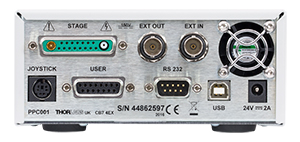
Click to Enlarge
Back Panel of PPC001 Piezo Controller
Figure 2.2 Information on the connectors is available in the Pin Diagrams tab.
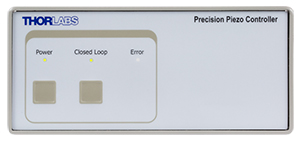
Click to Enlarge
Front Panel of PPC001 Piezo Controller
Figure 2.1 In the software, the front panel LEDs can be set to three intensities: full, dim, or off. The dim mode, shown above, is the default setting.
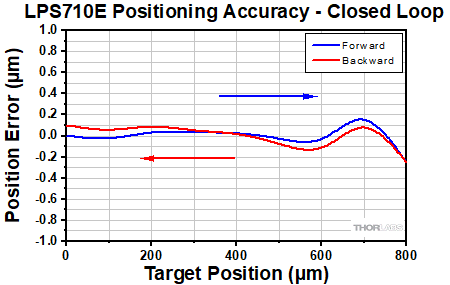
Click to Enlarge
Click for Raw Data
The positioning accuracy of the LPS710E piezo stage is provided over a range of target positions. In this test the stage is being operated in closed loop. A target position is set and a position error is found. Both forward and backward directional movements are measured. A Renishaw XL-80 laser interferometer was used to obtain this data.
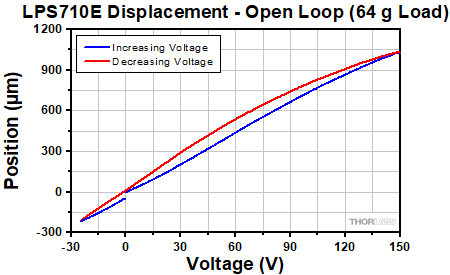
Click to Enlarge
Click for Raw Data
The displacement response of the LPS710E piezo stage to applied voltage is plotted above. In these tests, the voltage was first increased from 0 V to 150 V, then decreased to -25 V, and finally returned to 0 V. The initial and final positions are offset slightly due to hysteresis. A Renishaw XL-80 laser interferometer was used to obtain this data.
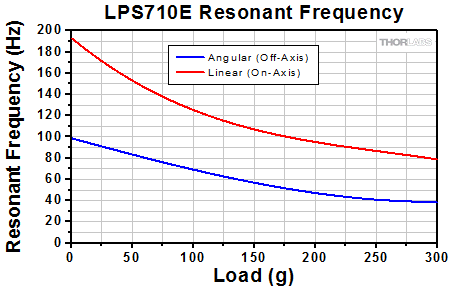
Click to Enlarge
Click for Raw Data
The resonant frequency of the LPS710E piezo stage as a function of the applied load is plotted above. Linear resonance occurs when the mounted load is symmetric with respect to the top mounting hole, or "on-axis". Angular resonance occurs when a load is mounted asymmetrically with respect to the top mounting hole, or "off-axis." To minimize angular resonance modes, keep the load's center of mass as close to the top mounting hole as possible.
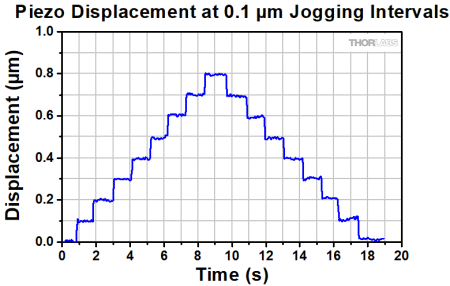
Click to Enlarge
The positioning behavior of the LPS710E was measured over time. In this test the stage is set to Jog at 0.1 µm intervals. The stage is being operated in closed loop, around the mid-range of travel (400 µm), and with a 14 g load mounted. A Renishaw XL-80 laser interferometer was used to obtain this data.
Software
Kinesis Version 1.14.56
The Kinesis Software Package includes a GUI for control of the stage.
Also Available:
- Communications Protocol
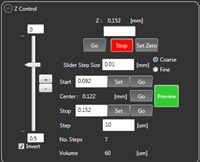
Click to Enlarge
Figure 4.2 Z Control Panel from ThorImage®LS Capture Setup Tab
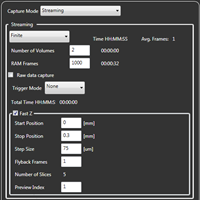
Click to Enlarge
Figure 4.3 Fast Z Panel from ThorImageLS Capture Tab
The stage can be driven using the included Kinesis® GUI, our ThorImage®LS software for Bergamo® III and confocal microscopes, or an externally supplied control voltage. In addition, a DB15 connector provides signals that can be used for synchronization with external equipment. Complete details on control are available in the LPS710E Kinesis manual (PDF link).
Open-Loop Operation vs. Closed-Loop Operation
There are two operating modes for positioning the stage: open loop and closed loop. In open-loop operation, which supports a travel range of 1100 µm ± 10%, the user controls the piezo drive voltage (in V). The applied drive voltage corresponds to some amount of stage displacement. For piezoelectric materials, this displacement does not depend linearly on the applied voltage: it exhibits nonlinearity and hysteresis. It is therefore not straightforward to position the stage by choosing the drive voltage. The stage's controller and built-in capacitive feedback sensors measure the stage displacement with
2 nm resolution in open-loop operation.
In closed-loop operation, which supports a travel range of 800 µm, the user directly controls the stage displacement (in µm). The built-in capacitive feedback sensors measure the stage displacement with 6 nm resolution in closed-loop operation.

Click to Enlarge
Figure 4.1 Kinesis® GUI Panel
Kinesis GUI
The Kinesis GUI supports both open- and closed-loop operation. The piezo drive voltage or stage displacement can be directly typed in or incremented or decremented in fixed, user-defined amounts.
In addition, the GUI enables manual PID loop tuning. The default settings are designed to provide stable operation, but manually fine tuning the PID loop and notch filters helps account for the specific objects mass in use in the experiment, reducing positional overshoots and ringing about the commanded objective position.
A screenshot is shown in Figure 4.1.
ThorImageLS Image Acquisition Software
ThorImageLS supports closed-loop operation. It allows the movement of the stage to be controlled from the same interface as Thorlabs' Bergamo III and confocal microscopes, greatly simplifying experimental integration. For convenience, controls for the stage are found in both the Capture Setup and Capture tabs. Screenshots are shown in Figures 4.2 and 4.3.
The ThorImageLS software works in conjunction with the Kinesis GUI, so the settings for the IO Control Mode should be set to 'Software + External BNC' before controlling the stage.
Externally Supplied Control Voltage
In this mode, the stage supports both open- and closed-loop operation. The voltage is applied using the external input BNC connector on the controller. The drive voltage or stage displacement that is determined by the input voltage is added to the value that is set in the GUI. If this sum would result in a drive voltage outside the -25 V to +150 V range, those limits will not be exceeded.
The external input BNC connector is typically used with sine, sawtooth, or square drive signals. The maximum frequency of the signal that should be applied depends upon the waveform. For large periodic waveforms (i.e., sine waves that provide >200 µm of total displacement), the recommended drive frequencies are:
- ≤40 Hz for Loads up to 50 g
- ≤30 Hz for Loads from 50 g to 150 g
- ≤20 Hz for Loads from 150 g to 300 g
For staircase waveforms with step sizes up to 50 µm, the minimum time between steps can be as small as the 25 ms typical settling time.
DB15 Connector
For photostimulation, electrophysiology, and optogenetics applications, the DB15 connector on the controller provides several electrical signals that can be used to synchronize the movement of the piezo stage with other equipment, such as multiphoton imaging lasers, patch clamp electrodes, and LED light sources. Details on this connector are available in Appendix A.2 of the Kinesis manual (PDF link).
Piezo Controller Pin Diagrams
Stage Connector

| Pin | Description | Pin | Description |
|---|---|---|---|
| 1 | HV Ground (Return) | 8 | HV Ground (Return) |
| 2 | Not Used | 9 | Not Used |
| 3 | Not Used | 10 | Stage IDb |
| 4 | Sine Wave Drive Output | 11 | Low Voltage Ground |
| 5 | Not Used | 12 | Low Voltage Ground |
| 6 | +15 V (Preamp Supply)a | 13 | Piezo ID (Legacy Stages)b |
| 7 | Low Voltage Ground | 14 | Position Sense Input (Strain Gauge) |
| Coaxial Male |
Position Sense Input (Capacitive) |
15 | -15 V (Preamp Supply)a |
| Coaxial Female |
HV Output |
User Connectora
Female DB15

| Pin | Description | Return | Pin | Description | Return |
|---|---|---|---|---|---|
| 1 | Digital Output 1 | 5, 9, 10 | 9 | Digital Ground | - |
| 2 | Digital Output 2 | 5, 9, 10 | 10 | Digital Ground | - |
| 3 | Digital Output 3 | 5, 9, 10 | 11 | For Future Use (Trigger Out) |
5, 9, 10 |
| 4 | Digital Output 4 | 5, 9, 10 | 12 | For Future Use (Trigger In)b |
5, 9, 10 |
| 5 | Digital Ground | - | 13 | Digital Input 4 | 5, 9, 10 |
| 6 | Digital Input 1 | 5, 9, 10 | 14 | 5 V Supply Output | 5, 9, 10 |
| 7 | Digital Input 2 | 5, 9, 10 | 15 | 5 V Supply Output | 5, 9, 10 |
| 8 | Digital Input 3 | 5, 9, 10 |
Computer Control via RS-232
Male DB9
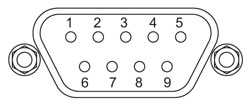
| Pin | Description | Pin | Description |
|---|---|---|---|
| 1 | Not Connected | 6 | Not Connected |
| 2 | RX (Controller Input) | 7 | Not Connected |
| 3 | TX (Controller Output) | 8 | Not Connected |
| 4 | Not Connected | 9 | Not Connected |
| 5 | Ground |
Computer Control via USB
Female Type B USB

External Input
BNC Female
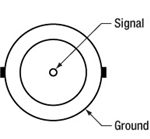
Input Voltage: -10 V to +10 V
Input Impedance: 10 kΩ
External Output
BNC Female

Output Voltage: 0 V to +10 V
Output Impedance (Min): 10 kΩ
Joystick Connector
Female Mini DIN
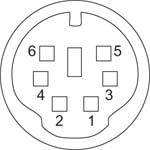
| Pin | Description | Pin | Description |
|---|---|---|---|
| 1 | RX (Controller Input) | 4 | +5 V, 100 mA Supply for Joystick |
| 2 | Ground | 5 | TX (Controller Output) |
| 3 | Ground | 6 | Ground |
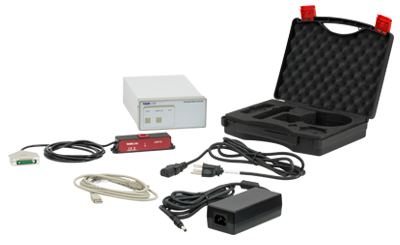
Click to Enlarge
Figure 6.1 Items Included with LPS710E(/M) (North American Power Cord Shown)
Item # LPS710E(/M) consists of the following:
- LPS710 or LPS710/M Stage
- PPC001 Piezo Controller
- Power Supply with Region-Specific Power Cord
- USB Cable for Computer Connections
- Storage Case with Slots for Stage and All Optional Accessories
The microscope slide holder and mirror mount are available for purchase separately. The box that houses the LPS710E has an insert for the LPSA1(/M) microscope slide holder and LPSA5(/M) mirror mount.
| Posted Comments: | |
Songyun Gu
(posted 2023-12-11 22:17:58.33) For the product LPSA1, I am wondering if you could make one with clear apeture? Maybe it can be in round shape and leave a blank hole in the middle while keeping the clamping mechanism. Thx! Piotr Sosinowski
(posted 2023-01-17 19:05:29.653) Dir Sirs,
I have a problem with PPC001 Piezo Controller. The controller has overvoltaged. Despite the replacement of obviously burnt out elements, the device still does not start. Can I count on help with the repair? Is it possible to share the electronic diagram so that I can repair it myself. Is only repair by your service possible. How much would the repair cost? I will be grateful for your help do'neill
(posted 2023-01-18 10:13:21.0) Response from Daniel at Thorlabs: I am sorry to hear this. We would not recommend you repair these yourself. I will reach out to you directly to discuss troubleshooting and your repair. |
 Products Home
Products Home














 Z-Axis Piezo Stage for Microscope Slides
Z-Axis Piezo Stage for Microscope Slides